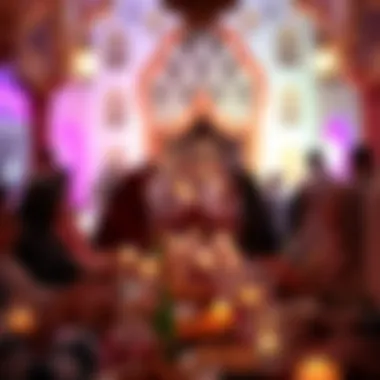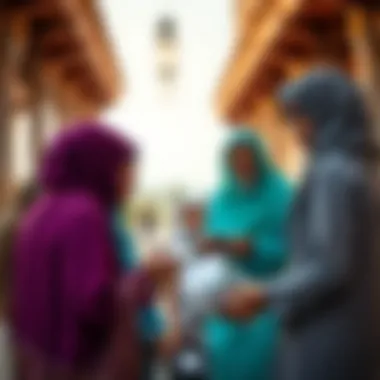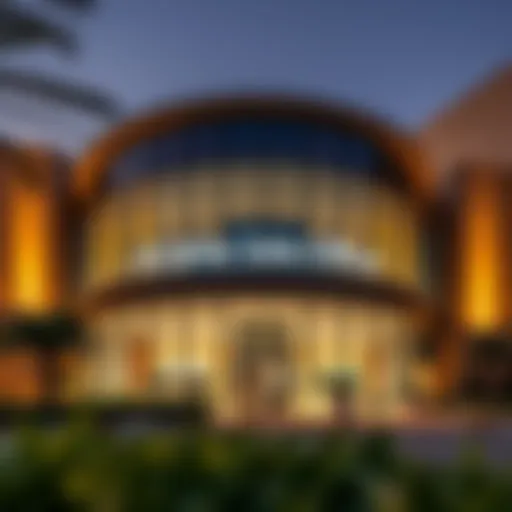Ramadan in the UAE: Culture, Traditions, and Market Effects


Intro
Ramadan, the holy month observed by millions of Muslims around the world, holds a unique significance in the UAE, where a blend of deep-rooted traditions and modern lifestyles creates a fascinating tapestry during this time. Drawing on the principles of reflection, self-control, and spiritual growth, Ramadan influences not just the lives of individuals, but also the overarching cultural and economic landscape of the nation.
During this period, community engagement and family gatherings are at the forefront of societal interactions. The act of fasting from dawn to sunset leads to deeply engrained customs, such as breaking the fast through iftar meals, sharing food with neighbors, and performing special prayers, known as taraweeh. These activities instill a sense of unity and charity, deeply resonating within Emirati values. In addition, as the nation navigates this spiritual journey, certain market implications arise, particularly affecting consumer behaviors and business strategies.
As we traverse through this article, we'll first delve into market insights, and examine how Ramadan impacts various sectors like real estate and commerce. Following this, we will explore investment strategies for prospective buyers and investors looking to navigate this dynamic landscape. Insights into trends, predictions, and actionable advice will equip stakeholders with a rounded grasp of Ramadan's deep-rooted influence in the UAE. With so much to uncover, let's jump right into the market insights.
Prelims to Ramadan in the UAE
Ramadan holds tremendous significance in the United Arab Emirates, deeply woven into both the religious and cultural fabric of the nation. For Muslims, it is not merely a month of fasting, but a time for spiritual reflection, increased devotion, and community bonding. The importance of this period is multi-layered, encompassing various traditions, rituals, and social practices that resonate with individuals, families, and communities.
Overview of Ramadan
During Ramadan, Muslims fast from dawn until sunset, refraining from food and drink along with other activities that may distract from spiritual growth. This fast is known as Sawm and is one of the Five Pillars of Islam, underlining its significance. The month begins with the sighting of the new moon, marking not just a change in the lunar calendar but also a cultural shift in the UAE. Traditionally, families gather to break their fast with a meal called Iftar, while the pre-dawn meal is referred to as Suhoor.
People share these moments with friends and family, reinforcing social ties during this sacred time. Public spaces become vibrant hubs of activity, with events and activities tailored to enhance the communal spirit and reflect the deep-rooted traditions of the UAE. Fasting is as much about the physical act of abstaining as it is about cultivating empathy and compassion for those less fortunate.
Religious Context
Ramadan’s roots are firmly planted in Islamic tradition. It is the ninth month of the Islamic calendar, believed to be the month in which the Quran was revealed to the Prophet Muhammad. Thus, during this period, Muslims focus on prayer, reading the Quran, and engaging in acts of charity. The fast serves as a reminder of the struggles of the less fortunate, urging individuals to donate to those in need. The UAE exemplifies these values through various charitable initiatives designed to uplift and support the wider community.
The time spent in spiritual reflection is further enriched by community prayers held at mosques, most notably the Taraweeh prayers, conducted after the obligatory nightly prayer. Besides physical restraint, Ramadan inspires a sense of self-discipline and self-reflection, prompting individuals to evaluate their values and priorities.
In broad scope, Ramadan plays an essential role in fostering unity among diverse communities residing in the UAE. While primarily a time for Muslims, non-Muslims are also welcomed to partake in certain festivities, highlighting the UAE's commitment to coexistence and understanding among different cultures.
“Ramadan is a time to reconnect with our faith, strengthen our relationships, and embrace our community.”
The Timing of Ramadan
The timing of Ramadan holds significant importance in shaping the experiences of Muslims around the world, especially in the United Arab Emirates. The observance of this holy month is not merely about fasting from dawn till dusk but encompasses a broader spiritual and cultural journey. Understanding when Ramadan falls is essential for grasping its societal reverberations, especially as it can directly influence daily routines, community activities, and even market dynamics.
The Lunar Calendar
Ramadan's timing is anchored in the Islamic lunar calendar, which consists of twelve months and is shorter than the Gregorian calendar by about ten to eleven days. This difference means that every year, Ramadan shifts approximately ten days earlier, offering a unique rotation through the seasons over time.
This lunar approach captures the essence of Ramadan by linking it to the natural rhythms of life, something deeply ingrained in Islamic tradition. For instance, when Ramadan falls in summer, the fasting period may be longer due to extended daylight hours, whereas in winter, days are shorter, providing a more manageable fasting experience.
In the UAE, the sighting of the moon announces the beginning of Ramadan each year. The local council often consults with religious authorities to confirm this sighting. Here are a few key aspects to note about the lunar calendar and Ramadan:
- Variation by Location: Different countries may start Ramadan on slightly different days based on local moon sightings, leading to diverse observances.
- Cultural Expressions: As Ramadan follows the lunar calendar, cultural practices associated with Ramadan can vary from one region to another within the UAE, resulting in an eclectic mix of traditions.
- Adaptable Schedules: Knowing that Ramadan moves through the seasons helps businesses and individuals prepare accordingly. For instance, in more temperate months, outdoor activities may thrive, increasing consumer engagement.
Determining the Start Date
Determining the start date of Ramadan can be both a spiritual and a logistical challenge. On the one hand, for devout practitioners, the precise timing typically involves a sense of anticipation built on observations and announcements. On the other hand, there are practical considerations for businesses and communities that depend on getting the timing right.
Ramadan begins when the new moon is sighted, marking a profound moment of reflection and commitment for Muslims. This is usually communicated through religious institutions, which relay the sighting to the public. Some key points concerning the determination of Ramadan’s start date include:


- Communication Channels: The announcement may be shared through social media platforms like Facebook, local news stations, or community gatherings, reaching diverse segments of the population.
- Multiple Sighting Reports: There can sometimes be discrepancies in moon sightings due to weather conditions or geographic differences. This can lead to a situation where communities in close proximity observe Ramadan on different days.
- Implications for Business and Scheduling: Companies, especially those involved in retail, hospitality, and services, need to be attentive when the starting date of Ramadan is declared. They often adjust their operating hours, marketing strategies, and inventory to better align with consumer behavior during the month.
In sum, understanding how and when Ramadan begins is crucial not only for the spiritual observance but also for maximizing opportunities that arise during this holy month. As Ramadan evolves annually, so too do its implications in various sectors, necessitating a keen awareness from all involved.
Cultural Traditions During Ramadan
Ramadan is not just a month of fasting; it embodies a deep cultural significance in the United Arab Emirates that extends well beyond abstaining from food and drink. The rich tapestry of traditions during this sacred month emerges from a blend of religious practices and social commitments, offering insights into the values of community, charity, and spirituality that define Emirati culture.
Understanding these cultural traditions during Ramadan is vital, as they shape not only individual behavior but also influence societal norms and economic activity. Businesses often kick their marketing strategies into high gear during this period, harnessing the communal spirit that Ramadan fosters.
Fasting Practices
Fasting during Ramadan, known as Sawm, is one of the Five Pillars of Islam and holds paramount importance in the lives of Muslims in the UAE. From dawn until dusk, abstaining from food and drink is more than a physical challenge; it’s a spiritual journey that encourages self-reflection, self-discipline, and a deeper connection to faith.
The act of fasting is generally observed by most Muslims and can reflect various personal motivations: seeking closeness to Allah, representing humility, and experiencing life from the viewpoint of those less fortunate.
In the UAE, many workplaces have adjusted schedules to allow employees to start later in the day, acknowledging the challenges of a fast. This consideration fosters respect and understanding within the community and among different cultures, as the day-to-day rhythms of life shift to accommodate the sacred observances of Ramadan.
Iftar and Suhoor
The culinary aspects of Ramadan are among the most cherished traditions. Iftar is the meal that breaks the fast at sunset, while Suhoor is consumed before dawn. Families and friends come together during these times, sharing food and fostering connections. The meals often feature an array of traditional dishes like harira, dates, and various sweets.
Interestingly, the UAE culture has also embraced international cuisines during Ramadan. You will find everything from Asian curries to Western desserts becoming popular choices at local restaurants. This blend demonstrates the cosmopolitan nature of the UAE, where various cultures intersect and enrich the Ramadan experience.
In many parts of the UAE, large tents are set up to host Iftar gatherings, inviting both locals and expatriates to share in the communal feast. These events are not just about food; they also serve as platforms for socialization and solidarity.
Community Gatherings
During Ramadan, community gatherings strengthen bonds among Emiratis as well as expats. Mosques become centers for community involvement, often hosting Iftar meals where donations from wealthier locals support those in need. The act of sharing food transcends cultural boundaries, fostering a sense of unity among diverse backgrounds.
Additionally, charitable initiatives surge during this time, reflecting the spirit of generosity that Ramadan promotes. Many individuals participate in outreach, providing food, clothes, and financial assistance. Volunteering at various charitable organizations is a common practice, as it aligns with the core Ramadan values of giving and selflessness.
"Charity during Ramadan is like giving water to a thirsty soul—it's a gift that keeps on giving."
This societal engagement extends to businesses that often align their corporate social responsibility efforts with Ramadan, establishing partnerships with local charities. Therefore, understanding these traditions is crucial for businesses looking to connect with a large segment of the population during this sacred month.
In summary, the cultural traditions during Ramadan in the UAE are vibrant reflections of the values of community, spirituality, and generosity. They influence not only personal conduct but also have significant implications for businesses and community organizations operating in this dynamic landscape.
For more about the cultural practices during Ramadan, you may visit resources like Wikipedia's entry on Ramadan or Britannica.
Celebrating Ramadan: Events and Activities
As Ramadan sweeps across the UAE, it brings with it a wave of events and activities that are not just about observance, but also about celebration and community bonding. The Holy Month is a period where the atmosphere transforms, creating a unique blend of spirituality, culture, and social engagement that resonates through the streets and homes across the nation. Understanding how these celebrations manifest offers insights into the broader societal values that define the Emirati community during this time.
Cultural Festivals
During Ramadan, various cultural festivals get underway, showcasing the rich tapestry of traditions in the UAE. Markets and public spaces come alive with events that invite everyone—whether local or a visitor—to immerse themselves in the festive spirit.
The Dubai Ramadan Festival, for instance, is a key highlight. It features artisanal handicrafts, traditional foods, and cultural performances that take you through a journey of Emirati culture. Families visit these festivals to shop for unique items, savouring local delicacies such as dates, and sweets made specially for this time.


These festivals not only celebrate local culture, but they also foster a spirit of inclusiveness.
- Exhibitions showcasing local artists: Here, attendees can engage with modern interpretations of traditional art.
- Culinary contests: Chefs display their culinary prowess, making this an exciting event for food enthusiasts.
- Live music and performances: These events often include live performances of traditional music and dance, drawing in crowds and creating a vibrant atmosphere.
Moreover, community-oriented activities help strengthen bonds among residents and expatriates alike, who come together to celebrate the spirit of Ramadan. Organizers often focus on ensuring there's something for everyone, creating a melting pot of cultures and practices amid festive cheer.
Charitable Initiatives
One of the most significant aspects of Ramadan is the emphasis on giving and compassion. Charitable initiatives take center stage, reflecting the core values of empathy and generosity that are paramount during this month. Numerous NGOs and community organizations roll out programs to facilitate donations, food distribution, and educational drives.
Many residents participate in Iftar meals aimed at less fortunate families, demonstrating unity through goodwill. This communal spirit often translates to larger-scale initiatives, such as:
- Food bank contributions: Organizations like the Emirates Red Crescent lead the charge in supplying food to those in need.
- Clothing drives: Many citizens gather to donate clothes and essentials, making sure no one is left behind during this holy season.
- Health and wellness campaigns: Ramadan is also a time to promote healthy living, with workshops and lectures on maintaining health while fasting.
Charitable initiatives during Ramadan serve not just to assist underprivileged individuals, but also to remind everyone of their social responsibilities, reinforcing the idea that caring for others is a key component of the faith.
"During Ramadan, we remember those who have less and come together in solidarity. It's a time to reflect on our blessings and extend a hand to those who need it most."
Ramadan's Impact on the Real Estate Market
The significance of Ramadan stretches beyond the spiritual realm. It casts a wide net of influence across various economic sectors, particularly the realm of real estate. This period presents unique conditions wherein demand and supply engage in a delicate dance, shaped by cultural practices and the communal spirit that defines the month. Understanding these dynamics is essential for investors, homebuyers, and real estate agents alike, as they navigate through fluctuating trends that can impact property values and investment opportunities during this holy season.
Market Dynamics
The market during Ramadan experiences fluctuations that can be both predictable and surprising. The fasting month leads to shifts in demand, culminating in interesting property dynamics. Traditionally, there’s heightened interest in rentals, especially for properties that cater to large families gathering for iftar. This demand can cause spikes in rental prices in certain popular neighborhoods, which makes it crucial for investors to keep their ear to the ground.
Additionally, as many expatriates come together in community gatherings and tent setups for communal meals, properties that offer proximity to major mosques or community centers often see a surge in short-term leasing.
"The rhythm of Ramadan means that property dynamics are not just about numbers; they're influenced by culture, community, and spirituality."
- Diverse effects on residential investments: Certain locations may become hotspots, driven by anticipated demand for both long-term rentals and temporary accommodations.
- Economic sentiment: Investors remain keenly aware of how consumer confidence shifts during this month, as people often reassess their living situations to accommodate family visits and festive gatherings.
Rental Trends
As Ramadan approaches, the rental landscape in the UAE transforms noticeably, with specific trends emerging that are vital for potential tenants and landlords alike.
One important trend during this period is the increase in short-term rentals. With families inviting loved ones to join in the month’s observances, there’s often a rush for properties that can accommodate visitors. Factors such as amenities for large gatherings and accessibility to mosques become key considerations for renters.
- Month-to-month leases: Many landlords will opt for flexible arrangements, allowing shorter lease terms to adapt to the surge in demand. This can incentivize more transient residents during Ramadan who might not wish to commit long-term during this festive month.
- Enhanced rental experience: Landlords may also enhance their properties—by providing kitchens that are well-equipped for cooking large meals or creating spaces conducive to gatherings—to attract potential renters.
While these trends paint a compelling picture of the seasonal rental market, they also usher in a labyrinth of challenges for landlords. The balance of supply and demand fluctuations may lead to pricing instability, causing anxiety for both parties.
Consumer Behavior Shifts During Ramadan
During Ramadan, a profound transformation unfolds in consumer behavior across the UAE. This shift is driven not only by religious observance but also by cultural norms that permeate various aspects of daily life. The holy month brings about significant changes in how people shop, dine, and engage in various activities. Understanding these shifts is crucial for businesses aiming to align their strategies with the needs and desires of consumers during this special period.
Retail and Shopping Trends
The retail landscape in the UAE experiences a noticeable uptick during Ramadan. Specifically, there’s an increase in purchases of food items, clothing, and gifts. Shoppers gravitate towards items that cater to their needs for Iftar and Suhoor, leading to a spike in demand for both traditional and modern delicacies.


- Increased Sales Promotions: Retailers understand the importance of this season and often roll out special promotions. Discounts on food products, household essentials, and clothing are common, enticing customers to purchase more.
- Market Dynamics: Consumers often plan ahead, buying gifts and festive foods in bulk. Retailers that adapt to this change in behavior can capitalize on increased sales volume.
- E-commerce Rise: With the convenience of online shopping, many consumers are turning to e-commerce platforms. These platforms see a significant rise in traffic, particularly for grocery and food delivery services.
"Ramadan is not just about fasting; it's a time for generosity which can be seen in the consumer's spending habits."
Dining and Culinary Trends
Culinary behavior in the UAE undergoes a metamorphosis during Ramadan. This is characterized by unique dining customs and the elevation of specific cuisines. The month serves as a canvas for celebrating traditional dishes and exploring new tastes.
- Iftar Buffets: Restaurants across the UAE present diverse Iftar buffets that cater to groups. Many diners prefer dining out instead of preparing meals at home. Establishments capitalize on this by offering special menus filled with local and international cuisine that speaks to the spirit of the month.
- Home Cooking Revival: On the other hand, the practice of preparing meals at home also sees a resurgence. Many families come together to prepare traditional foods like dates, soup, and mains that are rich in flavor and cultural significance. This creates a balance between dining out and home-cooked meals.
- Health-Conscious Options: There’s a growing trend towards healthy eating. As people continue to lead busy lives while fasting, many seek nutritious options that sustain energy levels. This has prompted restaurants to introduce lighter dishes and healthy meal options.
Understanding these consumer behavior shifts provides businesses valuable insights into how to effectively market and optimize their operations during Ramadan. By aligning with the cultural and religious significance of the month, companies can enhance customer satisfaction and, ultimately, sales.
Challenges and Considerations for Businesses
The significance of Ramadan in the UAE isn't only felt on an individual level; it's also a key event for businesses. Companies that navigate this period adeptly can build stronger connections with their customers. However, the challenges they face during this month are manifold and should be addressed proactively to reap the benefits.
Adjusting Operating Hours
Businesses in the UAE, especially retail and dining establishments, traditionally face a need to adapt their operating hours during Ramadan. The working hours frequently shift, with many organizations observing a compressed workday to accommodate for fasting. For instance, while most businesses might run from 9:00 AM to 5:00 PM typically, during Ramadan, these hours may transform into 10:00 AM to 4:00 PM, or even shorter.
This adjustment doesn't merely alter the clock; it impacts consumer traffic patterns significantly. Mornings might see less footfall as potential customers are either preparing for the day ahead or consuming their last meal before the fast begins. The bustle picks up post-iftar, the meal breaking the fast, which can lead to exceedingly crowded shopping environments.
Businesses that recognize this shift and adjust their staff schedules accordingly can enhance service and meet the increased demand in the evening. Understanding local customs and aligning hours with cultural expectations is crucial for maximizing revenue potential.
Marketing Strategies
When it comes to effective marketing, Ramadan represents a time ripe for tailored strategies that resonate with the spirit of the month. Traditional marketing tactics may not hit the mark as well; instead, businesses must embrace a unique approach that reflects Ramadan's ethos of community, generosity, and spiritual reflection.
A crucial aspect is creating campaigns that emphasize social responsibility. This could be through partnerships with local charities or initiatives aimed at giving back. For example, a restaurant might promote a 'Pay it Forward' campaign, where customers can pay for an iftar meal for someone in need. Campaigns like this not only boost brand reputation but also build a sense of community.
Furthermore, digital marketing gains prominence during this period. Social media platforms lit up with iftar recipes, community events, and special promotions can capture attention effectively. Brands should consider investing in local influencers who embody Ramadan's values to amplify their reach.
In addition, limited-time offers or promotions on traditional goods, such as dates and sweets, can tap into immediate consumer desires during this festive time. The confluence of thoughtful marketing, adjusted business hours, and genuine community engagement could position businesses favorably as they navigate the nuances of Ramadan in the UAE.
"Understanding the cultural dynamics at play encourages businesses to become part of the community rather than just within it."
By recognizing these challenges and tactfully implementing adjustments, companies can not only survive but thrive through the Ramadan period, strengthening customer loyalty and enhancing their overall market presence.
Closure: Embracing the Essence of Ramadan
In wrapping up the intricate tapestry of Ramadan as observed in the UAE, one cannot help but stress the immense value the holy month brings to individuals, families, and the broader community. It transcends mere fasting; it encapsulates values like empathy, reflection, and gratitude. Ramadan serves as a mirror reflecting the shared values and richness of the cultural heritage among diverse backgrounds in the UAE. Recognizing this significance is crucial, especially for those navigating both personal and professional landscapes during this profound period.
Reflecting on Cultural Significance
The cultural significance of Ramadan is multi-dimensional. First, it fosters an atmosphere of togetherness. Families come together for iftar, sharing meals that bridge generations and backgrounds. The act of fasting cultivates compassion toward the less fortunate, pushing the community to engage in charitable acts. Mosques bristle with activity as the call to prayer resonates throughout neighborhoods, inviting everyone to step away from daily distractions and focus on spiritual sustenance.
"Ramadan is not just a month of fasting, but a season for deepening social ties and cultural connections."
Moreover, the traditions surrounding this time expand into communal gatherings that go beyond the religious. Events like Mawlid, celebrating the birth of the Prophet Muhammad, often take place in conjunction with Ramadan, enriching the social fabric. These traditions establish a platform for dialogue and understanding, showcasing the UAE’s commitment to cultural pluralism.
Looking Ahead: The Future of Ramadan in the UAE
As we anticipate the future trajectory of Ramadan in the UAE, key trends are beginning to emerge. Increasing globalization means that cultural exchanges will likely enhance Ramadan practices, making them more accessible and relatable to expatriates and locals alike. We may witness the evolution of iftar menus that blend traditional Arabic cuisine with international flavors, reflecting a fusion of culinary identities.
In terms of economic implications, businesses are expected to adapt proactively to shifting consumer demands revolving around Ramadan. Enhanced marketing strategies, such as the incorporation of social media campaigns surrounding charitable activities or local events, may cultivate a deeper connection with consumers. This adaptation is essential for brands hoping to thrive in this competitive marketplace, where emotional branding resonates strongly with the public.







